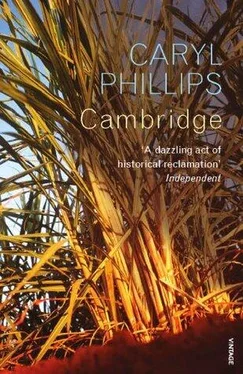Caryl Phillips - Cambridge
Здесь есть возможность читать онлайн «Caryl Phillips - Cambridge» весь текст электронной книги совершенно бесплатно (целиком полную версию без сокращений). В некоторых случаях можно слушать аудио, скачать через торрент в формате fb2 и присутствует краткое содержание. Год выпуска: 2009, Издательство: Vintage Digital, Жанр: Современная проза, на английском языке. Описание произведения, (предисловие) а так же отзывы посетителей доступны на портале библиотеки ЛибКат.
- Название:Cambridge
- Автор:
- Издательство:Vintage Digital
- Жанр:
- Год:2009
- ISBN:нет данных
- Рейтинг книги:5 / 5. Голосов: 1
-
Избранное:Добавить в избранное
- Отзывы:
-
Ваша оценка:
- 100
- 1
- 2
- 3
- 4
- 5
Cambridge: краткое содержание, описание и аннотация
Предлагаем к чтению аннотацию, описание, краткое содержание или предисловие (зависит от того, что написал сам автор книги «Cambridge»). Если вы не нашли необходимую информацию о книге — напишите в комментариях, мы постараемся отыскать её.
Cambridge — читать онлайн бесплатно полную книгу (весь текст) целиком
Ниже представлен текст книги, разбитый по страницам. Система сохранения места последней прочитанной страницы, позволяет с удобством читать онлайн бесплатно книгу «Cambridge», без необходимости каждый раз заново искать на чём Вы остановились. Поставьте закладку, и сможете в любой момент перейти на страницу, на которой закончили чтение.
Интервал:
Закладка:
The prospect of such easy wealth has attracted many quacks and under-qualified physicians to these islands, but as yet there is no thorough means of checking a man's credentials should he step from a ship and claim the title of Doctor. Mr McDonald, however, seems ably fitted for the office, and to be acquainted not only with the frontiers of his profession, but with the personal business of this populous island, both black and white. His medical conclusion was that a book of medical treatment, especially of such diseases as are incidental to tropical climes, should be kept on every West Indian property. His recipe for white survival was as follows: to avoid exposure to the sun, eat sparingly, avoid mixing wines and fruits, take no coconut water, malt liquor or cider, eat a fair proportion of animal food or fish, and take at least two to three glasses of Madeira every day. Fear is the greatest dispatcher, but after the first rainy season the Englishman is seasoned, although some beneficial exercise beyond the sun's rays is to be recommended. According to Mr McDonald the climate of the West Indies is still spoken of with dread by those who have never crossed the Atlantic, and by others who have lost relatives through imprudence. There is in this grave talk much exaggeration and a good deal of ignorance. Mr McDonald's conversations were warmly welcome as I lay prostrate and panting on my bed, unable to find sleep, yet not so enervated that I was unable to pay attention to his finely chosen words. Clearly this was a man of impartial mind who would neither herd with the unprincipled whites, nor rally the blacks for their self-evident inferiority.
Stella is yet another who seems extraordinarily well qualified for the role of dutiful and patient attendant to the infirm. Of her pedigree there appears to be nothing that one might term unusual. Her mother was born a slave in these parts, but of her father she claims to know little, believing him to have been sold off to another estate. Perhaps this is her black way of disguising some greater embarrassment? A fine breeder, her three surviving children have long since been scattered to distant plantations. When she speaks of her lost children, Stella adopts the familiar doting tones of a mother, wishing to see them grown into strong and responsible men, but sadly having little notion of their present whereabouts or their moral or physical well-being. The father of these children remains a mystery, but I suspect strongly that the three siblings do not share the same paternal blood. According to Mr McDonald negro relations would appear to have much in common with those practised by animals of the field, for they seem to find nothing unnatural in breeding with whomsoever they should stumble upon.
An indication of the looseness of negro morals might be derived from an examination of how easily they appropriate titles which in our world have a deep and proper meaning, but in theirs appear to be little more than mere sport. For instance, among negroes it is almost an affront to address those with whom one is familiar by their name without first affixing some prefix of relationship. So it was, even before the onset of my tremulous condition, that Stella asked me if I might address her as Aunt Stella. Well, you might imagine my surprise at this request! I had no hesitation in refusing. After all, my aunts Mabel and Victoria bore no relation, physical or otherwise, to this ebony matriarch, so how could I bind them together with the same word? For a few moments Stella fell into a melancholy, and men, understanding that I was unlikely to change my mind, she reclaimed her humour.
It was Mr McDonald who informed me that during my illness, when comprehension of the world about me was beyond my powers, dear Stella would always be the first to volunteer to sit with me, often right through the night and to the detriment of whatever duties she might have back at her hut. Hers was the voice that first greeted me as I returned to consciousness. She whispered in hushed joy, 'Me misses, me hope you live long, very long; me hope you live to bury all your pickaninnies.' Friendship is a plant of slow growth in every climate, but it would appear that Stella and I are flying in the face of mother nature. These days we often engage in close conversation for anything up to an hour's duration. One of her favourite subjects is the retelling of the joys of her life, lest I should be in any confusion as to her desire to remain a slave upon this estate. 'For yam [eatables], misses, me got rice, me got salt-fish and fresh meat — and misses, now and den, me get ripe plantain and banana. . Misses, Buckra very good, plenty for yam [to eat], plenty for wear; Buckra-man rise early, but me no like de morning; and nigger no like cold.' My veneration for this dusky maiden ever deepens, and by the day I grow increasingly respectful of her honesty with a frail visitor such as myself.
Stella's loyalty is, I am led to understand, typical of her people. It would appear that Mr Wilberforce and his like have been volleying well wide of the mark, for the greatest fear of the black is not having a master whom they know they can turn to in times of strife. The knowledge of whom and where one's master is affords the black status. 'You belong no massa' is a contemptuous reproach of the highest order. I have been constantly subjected to the glozing of these dark helots on this very same subject. 'What for me want free? Me have good good massa, and when me sick, massa doctor come and physic me. Me no want to leave massa.' 'Free, misses! What for me wish to be free? Me work till me die for misses and massa. Lord have mercy, I no want to leave massa!' Such sentiments are delivered with considerable affection, and more than one imploring dark clasp has been laid upon my dress to solicit my attention to the misery that would ensue should they be spurned. The blacks are so well aware of the comforts that are to be enjoyed under massa's rule, that many, particularly those beyond the prime of life, will never accept manumission. That Stella is able to wait hand and foot upon the absent massa's daughter gives her additional status, although I would imagine it difficult to augment her already high rank on the estate.
I am not yet more than superficially familiar with the negro stock, but from my observations of those blacks who flit in and out of my chambers, from my talks with Mr McDonald, and from my close acquaintance with Stella, I am able to set down a few preliminary truths about the origins and subsequent behaviour of these creatures. Before the abolition the Africans arrived in these parts in a state of complete nudity. This cargo of livestock could be as large as two hundred and upwards. Merchants gathered by the dockside and purchased the negroes as they would horses or mules. Some owners had a fancy for maiming their African slaves, some branded them, pulled out some teeth, or wounded them a little with shot, while others wished them whole in order that they might stud the stock. The ending of the trade means that there are littered about these shores fewer and fewer Africans. Those that remain are daily wearing out and dropping to the ground, so that today the great majority of the negroes are Creoles. In England the term creole is generally meant to describe those of mongrelized origins, but here the term refers to any, black or white, who is either well-seasoned, and thus deemed to have safely entered this new tropical life, or has been born in this zone and is therefore a full participant in the day-to-day commerce that surrounds the production of American sugar. One important advantage of this creolization of the negro is that the pure African has a far greater tendency towards madness and eventual suicide.
Clearly the negroes cannot be silent, for they talk indefatigably, and in spite of themselves, and in all seasons. Whether joyful or grieving, they find full employment for the tongue. They often choose to speak with themselves, answering their own questions and maintaining different characters, rather than fall victims to silence. The loquacious tongue of the creole negro boasts much bad dialect, but that of the African is almost unintelligible and requires abundant patience if it is to be understood. Although it originates in English and displays many striking expressions, it is so uncouth a jargon to those unaccustomed to it, that it is almost as if they were to speak in one of their divers native tongues. They talk long, loud, and rapidly, but seldom deliver anything of import. Every passion known to man acts upon the negroes with the strangest intensity; their anger is sudden and ferocious, their mirth noisy and excessive, their curiosity audacious.
Читать дальшеИнтервал:
Закладка:
Похожие книги на «Cambridge»
Представляем Вашему вниманию похожие книги на «Cambridge» списком для выбора. Мы отобрали схожую по названию и смыслу литературу в надежде предоставить читателям больше вариантов отыскать новые, интересные, ещё непрочитанные произведения.
Обсуждение, отзывы о книге «Cambridge» и просто собственные мнения читателей. Оставьте ваши комментарии, напишите, что Вы думаете о произведении, его смысле или главных героях. Укажите что конкретно понравилось, а что нет, и почему Вы так считаете.












